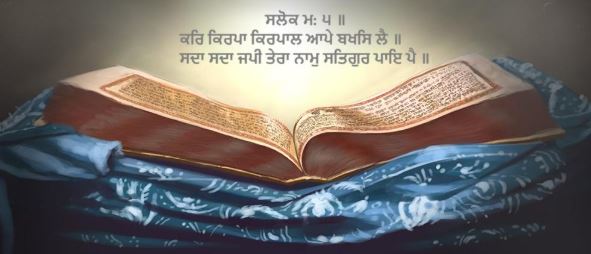We’ve all been there, hurt by someone’s words, betrayed by their actions, or misunderstood in ways that leave scars. It feels natural to hold onto resentment or seek revenge in those moments. But the wisdom of Sikh teachings gently nudges us toward a different path – a path of forgiveness (khima) and compassion (daya).
These aren’t just moral ideals but transformative practices that liberate us from the pain we carry. Forgiveness and compassion, as taught by the Gurus, are acts of courage and love that bring us closer to Waheguru and help us discover inner peace.
Forgiveness: A Gift to Ourselves
In Sikhism, forgiveness is much more than letting go of a grudge. It’s about freeing ourselves from the chains of anger and bitterness that weigh us down. The Gurus teach us that just as Waheguru forgives us countless times for our mistakes, we, too, must learn to forgive others.
Guru Nanak Dev Ji says:
ਬਖਸੰਦ ਸਾਹਿਬ ਬਖਸ ਲੈ, ਸੇਵਕ ਕਰਿ ਕਿਰਪਾ ਨੀਤ।
ਗੁਣ ਅਵਗਣ ਮੂਰਖ ਅਜਾਣਾ, ਤੂੰ ਬਖਸੰਦ ਅਹੰਦੀਤ।
(The Forgiving Lord forgives us, showing kindness to His servants daily. Whether full of virtues or faults, foolish or ignorant, You forgive without hesitation.)
Forgiveness doesn’t mean condoning someone’s hurtful behavior. It means choosing peace over pain. It’s about saying, “I will not let what you did to me define how I feel or who I am.”
Compassion: The Heart of Sikh Teachings
At the core of Sikhism lies daya – compassion. It’s the ability to feel and act to relieve someone else’s pain. Compassion isn’t just a feeling; it’s an expression of Waheguru’s love through us.
Guru Nanak Dev Ji’s life is a living example of compassion in action. Whether feeding the hungry through Langar, standing against injustice, or uplifting those cast aside by society, his teachings remind us that true spirituality lies in serving others with a kind and selfless heart.
Guru Nanak Dev Ji also shared this universal truth:
ਧੌਲ ਧਰਮ ਦਇਆ ਕਾ ਪੂਤ, ਸੰਤੋਖੁ ਥਾਪ ਰਖਿਆ ਜਿਨਿ ਸੂਤ।
(Dharma, born of compassion, held steady by the thread of contentment, is the mythical bull that supports the world.)
Compassion isn’t about pity. It’s about recognizing the oneness of all creation and acting with humility and love. It’s seeing Waheguru’s light in every being and knowing that their pain is our pain, too.
Forgiveness and Compassion Together
Forgiveness and compassion go hand in hand. When someone hurts us, compassion allows us to see their humanity – their struggles, their flaws. Forgiveness then helps us release the burden of anger. Together, they create a path to inner freedom.
Guru Gobind Singh Ji exemplified this union of forgiveness and compassion. Even after the betrayal that led to the loss of his family, Guru Ji refused to let hatred cloud his heart. Instead, he prayed for courage and strength:
ਦੇਹ ਸ਼ਿਵਾ ਬਰ ਮੋਹਿ ਇਹੈ, ਸੁਭ ਕਰਮਨ ਤੇ ਕਬਹੁ ਨਾ ਟਰੋਂ।
(Grant me this boon, O Lord, that I may never deviate from righteous actions.)
Guru Ji’s ability to forgive and remain compassionate in the face of immense pain teaches us the power of rising above personal suffering for a higher purpose.
Why Is It So Hard to Forgive?
Let’s face it – releasing hurt and anger isn’t easy. It challenges our ego (ਹਉਮੈ), which thrives on holding onto grudges and feeling justified in our pain. But Sikhism reminds us that ego is the root of all suffering. When we forgive, we’re not letting the other person off the hook; we’re setting ourselves free.
Guru Nanak Dev Ji reminds us:
ਹਉਮੈ ਨਾਵੈ ਨਾਲਿ ਵਿਰੋਧੁ ਹੈ, ਦੋਏ ਨ ਵਸਹਿ ਇਕ ਠਾਇ।
(Ego and the Divine Name cannot dwell in the same heart.)
Forgiveness clears the space in our hearts so that Waheguru’s love can flow freely.
How Can We Cultivate Forgiveness and Compassion?
- Turn to Gurbani: The Guru’s words are a source of healing and wisdom. Regularly reading and reflecting on Gurbani reminds us of the bigger picture – this world’s temporary nature and Waheguru’s eternal peace.
- Practice Naam Simran: Chanting Waheguru’s name calms the mind and dissolves feelings of anger or resentment. It helps us focus on what truly matters.
- Empathize with Others: Compassion begins with understanding. Before judging or reacting, see the situation from the other person’s perspective.
- Let Go of the Ego: Forgiveness becomes possible when we release the need to be right or justified. Surrendering to Waheguru’s will (ਹੁਕਮ) brings peace.
- Seek Waheguru’s Grace: Pray for the strength to forgive and the wisdom to act compassionately.
The Freedom of Forgiveness and Compassion
When we choose forgiveness and compassion, we break free from the cycle of hurt and anger. We stop carrying the weight of the past and open ourselves to the present moment filled with Waheguru’s light and love.
Guru Nanak Dev Ji taught us:
ਮਨ ਜੀਤੈ ਜਗੁ ਜੀਤੁ।
(By conquering your mind, you conquer the world.)
The real victory isn’t in defeating others but in overcoming the struggles within ourselves. Forgiveness and compassion are tools for this inner triumph.
A Prayer for the Journey
In moments when anger or hurt feels overwhelming, let us turn to Waheguru and pray:
ਹੇ ਵਾਹਿਗੁਰੂ ਜੀ, ਮੈਨੂੰ ਸਮਰਥਾ ਦੇਵੋ ਕਿ ਮੈਂ ਦੂਜਿਆਂ ਨੂੰ ਮਾਫ਼ ਕਰ ਸਕਾਂ। ਮੈਨੂੰ ਦਇਆ ਭਰਿਆ ਹਿਰਦਾ ਬਖ਼ਸ਼ੋ, ਤਾਂ ਜੋ ਮੈਂ ਹਰ ਜੀਵ ਵਿੱਚ ਤੁਹਾਡਾ ਪ੍ਰਕਾਸ਼ ਵੇਖ ਸਕਾਂ। ਮੇਰੇ ਮਨ ਨੂੰ ਤੇਰੇ ਪਿਆਰ ਨਾਲ ਭਰ ਦੇਵੋ।
(O Waheguru, grant me the strength to forgive others and a heart filled with compassion. Help me see Your light in every being and fill my mind with Your love.)
We transform our lives and the world by embracing forgiveness and compassion. Let’s walk this path together, hand in hand with Waheguru’s grace.


Leave a Reply